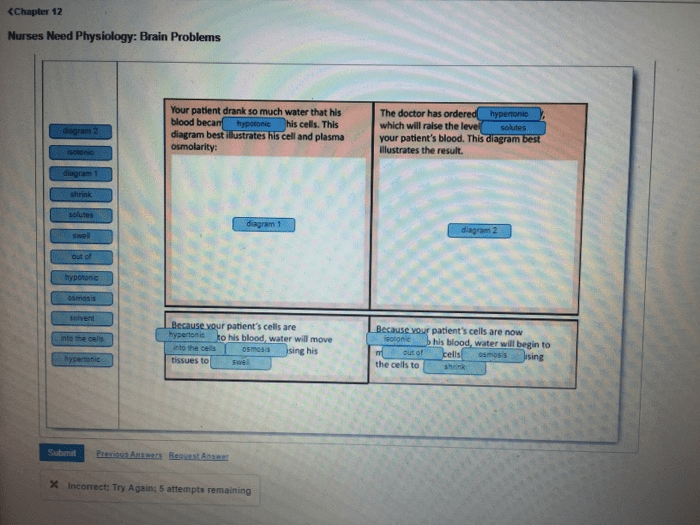Nurses need physiology hemoglobin and genetics to provide optimal patient care. Physiology helps nurses understand the body’s functions, hemoglobin is essential for oxygen transport, and genetics influences disease development. This article explores the importance of these concepts for nurses and their implications for nursing practice.
Physiology provides nurses with a foundation for understanding how the body maintains homeostasis. By comprehending the cardiovascular, respiratory, and renal systems, nurses can assess and intervene to prevent or treat imbalances. Hemoglobin, a protein in red blood cells, carries oxygen throughout the body.
Nurses monitor hemoglobin levels to detect anemia and other conditions that affect oxygen delivery.
Physiology of Nurses

Nurses play a crucial role in maintaining homeostasis, the body’s ability to regulate its internal environment. To effectively manage this task, nurses must possess a comprehensive understanding of the cardiovascular, respiratory, and renal systems.
Cardiovascular System
- Nurses monitor blood pressure, heart rate, and cardiac output to assess cardiovascular function.
- They administer medications to regulate blood pressure and heart rate, and provide care for patients with cardiovascular diseases.
Respiratory System
- Nurses assess respiratory rate, depth, and oxygen saturation levels to monitor respiratory function.
- They provide respiratory care, such as oxygen therapy and mechanical ventilation, and educate patients on respiratory hygiene.
Renal System
- Nurses monitor urine output, specific gravity, and electrolyte levels to assess renal function.
- They administer medications to manage fluid and electrolyte balance, and provide care for patients with renal diseases.
Hemoglobin in Nursing Practice
Hemoglobin is a protein found in red blood cells that carries oxygen throughout the body. Nurses play a vital role in monitoring hemoglobin levels and managing patients with abnormal hemoglobin levels.
Structure and Function of Hemoglobin
Hemoglobin is composed of four polypeptide chains and four heme groups. It binds to oxygen in the lungs and releases it in the tissues.
Monitoring Hemoglobin Levels
- Nurses obtain blood samples to measure hemoglobin levels.
- They interpret the results and notify the healthcare provider if hemoglobin levels are abnormal.
Implications of Abnormal Hemoglobin Levels
- Anemia: Low hemoglobin levels can lead to fatigue, shortness of breath, and impaired cognitive function.
- Polycythemia: High hemoglobin levels can increase the risk of blood clots and stroke.
Genetics and Nursing

Genetics plays a significant role in disease development and nurses must understand genetic principles to provide comprehensive patient care.
Role of Genetics in Disease Development
- Genetic mutations can increase the risk of developing certain diseases, such as cancer, heart disease, and diabetes.
- Nurses need to be aware of the genetic risk factors for common diseases and educate patients accordingly.
Importance of Nurses Understanding Genetic Principles
- Nurses can provide genetic counseling to patients and families.
- They can advocate for genetic testing when appropriate and interpret genetic test results.
Interdisciplinary Collaboration: Nurses Need Physiology Hemoglobin And Genetics
Interdisciplinary collaboration is essential in healthcare and nurses play a key role in facilitating communication between different healthcare professionals.
Importance of Interdisciplinary Collaboration, Nurses need physiology hemoglobin and genetics
- It improves patient outcomes by ensuring that all aspects of care are addressed.
- It reduces errors and improves efficiency by streamlining communication and sharing information.
Role of Nurses in Facilitating Interdisciplinary Communication
- Nurses act as liaisons between patients, physicians, and other healthcare professionals.
- They document patient information, coordinate care plans, and provide updates to the healthcare team.
Evidence-Based Practice

Evidence-based practice is a cornerstone of modern nursing and nurses play a crucial role in evaluating and implementing evidence-based interventions.
Importance of Evidence-Based Practice
- It improves patient outcomes by ensuring that care is based on the best available evidence.
- It reduces costs by preventing unnecessary interventions and improving efficiency.
Role of Nurses in Evaluating and Implementing Evidence-Based Interventions
- Nurses conduct literature reviews and appraise research findings.
- They implement evidence-based interventions into their practice and evaluate their effectiveness.
Key Questions Answered
What is the role of nurses in maintaining homeostasis?
Nurses play a crucial role in maintaining homeostasis by assessing vital signs, monitoring fluid and electrolyte balance, and administering medications to regulate body functions.
Why is it important for nurses to understand the cardiovascular, respiratory, and renal systems?
Understanding these systems allows nurses to assess and intervene in conditions such as heart failure, respiratory distress, and kidney disease, which are common in hospitalized patients.
How do nurses use their knowledge of genetics in practice?
Nurses use their knowledge of genetics to identify patients at risk for inherited diseases, provide genetic counseling, and administer genetic testing.